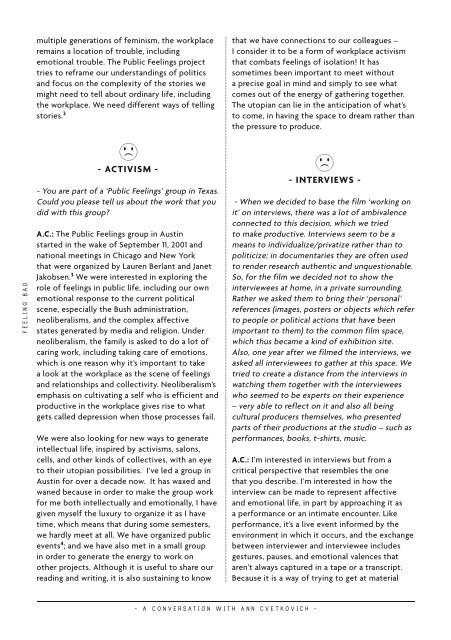a conversation with ann Cvetkovich - karin michalski
a conversation with ann Cvetkovich - karin michalski
a conversation with ann Cvetkovich - karin michalski
Create successful ePaper yourself
Turn your PDF publications into a flip-book with our unique Google optimized e-Paper software.
feeling bad<br />
multiple generations of feminism, the workplace<br />
remains a location of trouble, including<br />
emotional trouble. The Public Feelings project<br />
tries to reframe our understandings of politics<br />
and focus on the complexity of the stories we<br />
might need to tell about ordinary life, including<br />
the workplace. We need different ways of telling<br />
stories. 2<br />
- activism -<br />
- You are part of a ‘Public Feelings’ group in Texas.<br />
Could you please tell us about the work that you<br />
did <strong>with</strong> this group?<br />
a.c.: The Public Feelings group in Austin<br />
started in the wake of September 11, 2001 and<br />
national meetings in Chicago and New York<br />
that were organized by Lauren Berlant and Janet<br />
Jakobsen. 3 We were interested in exploring the<br />
role of feelings in public life, including our own<br />
emotional response to the current political<br />
scene, especially the Bush administration,<br />
neoliberalisms, and the complex affective<br />
states generated by media and religion. Under<br />
neoliberalism, the family is asked to do a lot of<br />
caring work, including taking care of emotions,<br />
which is one reason why it’s important to take<br />
a look at the workplace as the scene of feelings<br />
and relationships and collectivity. Neoliberalism’s<br />
emphasis on cultivating a self who is efficient and<br />
productive in the workplace gives rise to what<br />
gets called depression when those processes fail.<br />
We were also looking for new ways to generate<br />
intellectual life, inspired by activisms, salons,<br />
cells, and other kinds of collectives, <strong>with</strong> an eye<br />
to their utopian possibilities. I’ve led a group in<br />
Austin for over a decade now. It has waxed and<br />
waned because in order to make the group work<br />
for me both intellectually and emotionally, I have<br />
given myself the luxury to organize it as I have<br />
time, which means that during some semesters,<br />
we hardly meet at all. We have organized public<br />
events 4 ; and we have also met in a small group<br />
in order to generate the energy to work on<br />
other projects. Although it is useful to share our<br />
reading and writing, it is also sustaining to know<br />
- a COnveRSaT i O n wiT h a nn CveT k O viC h -<br />
that we have connections to our colleagues –<br />
I consider it to be a form of workplace activism<br />
that combats feelings of isolation! It has<br />
sometimes been important to meet <strong>with</strong>out<br />
a precise goal in mind and simply to see what<br />
comes out of the energy of gathering together.<br />
The utopian can lie in the anticipation of what’s<br />
to come, in having the space to dream rather than<br />
the pressure to produce.<br />
- interviews -<br />
- When we decided to base the film ‘working on<br />
it’ on interviews, there was a lot of ambivalence<br />
connected to this decision, which we tried<br />
to make productive. Interviews seem to be a<br />
means to individualize/privatize rather than to<br />
politicize; in documentaries they are often used<br />
to render research authentic and unquestionable.<br />
So, for the film we decided not to show the<br />
interviewees at home, in a private surrounding.<br />
Rather we asked them to bring their ‘personal’<br />
references (images, posters or objects which refer<br />
to people or political actions that have been<br />
important to them) to the common film space,<br />
which thus became a kind of exhibition site.<br />
Also, one year after we filmed the interviews, we<br />
asked all interviewees to gather at this space. We<br />
tried to create a distance from the interviews in<br />
watching them together <strong>with</strong> the interviewees<br />
who seemed to be experts on their experience<br />
– very able to reflect on it and also all being<br />
cultural producers themselves, who presented<br />
parts of their productions at the studio – such as<br />
performances, books, t-shirts, music.<br />
a.c.: I’m interested in interviews but from a<br />
critical perspective that resembles the one<br />
that you describe. I’m interested in how the<br />
interview can be made to represent affective<br />
and emotional life, in part by approaching it as<br />
a performance or an intimate encounter. Like<br />
performance, it’s a live event informed by the<br />
environment in which it occurs, and the exchange<br />
between interviewer and interviewee includes<br />
gestures, pauses, and emotional valences that<br />
aren’t always captured in a tape or a transcript.<br />
Because it is a way of trying to get at material


